EXTEND
& PRETEND:
Is the US Facing a Cash Crunch?
 The
US Government is caught in a cash vise and is being squeezed between
too slow a rebound in tax revenues and the limitations on how quickly it
can realistically take its funding requirements to the US Treasury
auction. The US Treasury was saved in March by what the government reports
as “proprietary receipts”. Those receipts require an explanation that is
not well publicized since it begs the question of what happens next month
without the $117 BILLION journal entry.
The
US Government is caught in a cash vise and is being squeezed between
too slow a rebound in tax revenues and the limitations on how quickly it
can realistically take its funding requirements to the US Treasury
auction. The US Treasury was saved in March by what the government reports
as “proprietary receipts”. Those receipts require an explanation that is
not well publicized since it begs the question of what happens next month
without the $117 BILLION journal entry.
The March cash management numbers from the US Treasury’s Financial
Management Service are alarming and in my estimation have become perilous.
The economy is simply taking much too long to recover which is affecting
urgently required tax receipts.
If the US Treasury issues even higher debt supply to the market too fast,
it threatens driving up interest rates prematurely and thereby elevating
already strained government financing costs despite already increased
supply. Since the US government has steadily reduced maturity duration
over the last few years to obfuscate a growing debt problem, the issue is
compounded by the rapidly increasing levels of roll-over funding now
additionally being required.
It is a tricky balance between gauging how fast tax receipts will return
and what supply the monthly treasury auction is able to absorb. Cash flow
is the primary reason small businesses fail unexpectedly. This is also why
sovereign governments fail abruptly.
We witnessed in Greece what happens when investors get nervous. Yields not
only spike but typically
move to even higher levels than most originally
thought possible.
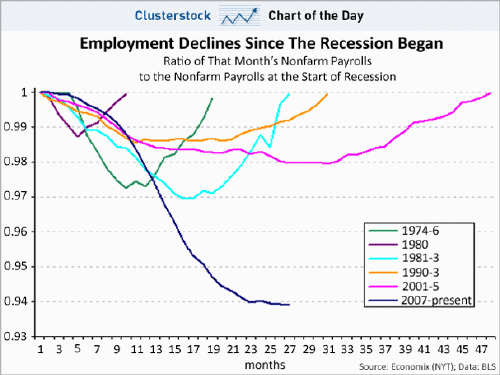
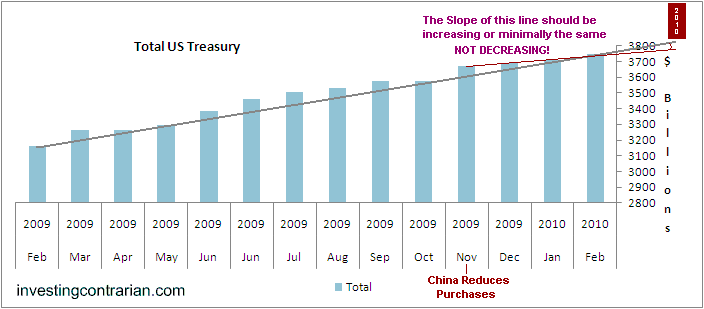
US TREASURY CASH
REQUIREMENTS
On April 14th the Financial Management Service, a bureau of the
US Department of the Treasury released its
Monthly Treasury Statement for March 2010. I was waiting for
it because of what I saw in February - the gap between receipts
and outlays was widening disturbingly.
I knew the US Treasury was going to have to pull a ‘rabbit out of a hat’
or we might see a similar scare in the US Treasury Auction, with a spike
in treasury yields that occurred in Greece. What was reported was a
mystery and for those that read
Extend & Pretend: Gaming the US Tax Payer, I will call this Suspicious
Clue #8.
SUSPICIOUS CLUE #8
-
PROPRIETARY RECEIPTS FROM THE PUBLIC
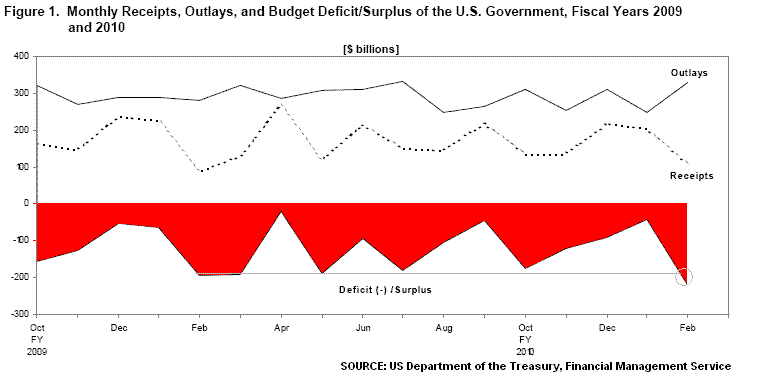
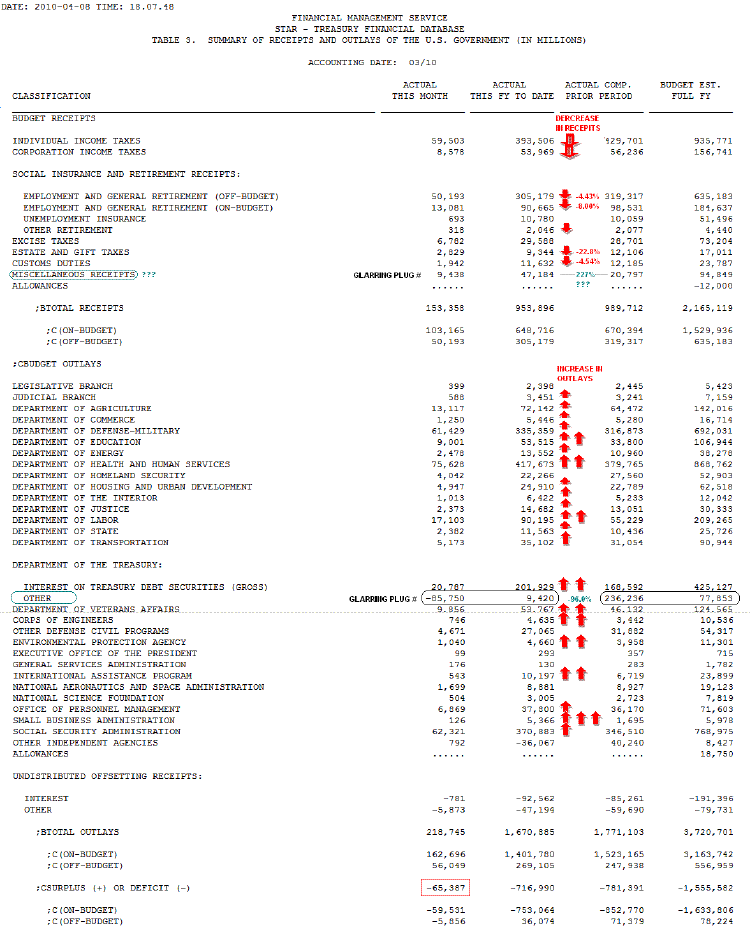
CLICK TO ENLARGE
The report shows US Treasury receipts were down disturbingly and almost
all government outlays were up. I personally have had Profit & Loss
responsibility on numerous occasions during my career and I would have
been apprehensive facing the auditors or board of directors with such a
blatant example of mismanagement. Absolutely no cuts in expenses, with
falling revenues, all made to marginally appear better than the February
report by a single line item called “other”. Executives get fired for
such a report but governments just carry on until the inevitable crisis
event finally occurs. Then the traditional blame game begins, blame is
assigned and belated and poorly formulated policy responses are enacted.

So what is this ‘other’? When you examine the Outlay Ledger of the
Department of the Treasury for March 2010 (below) you see it to be a
onetime item classified as a negative outlay. For the non accountants, this
is a government receipt that is placed in the outlays as a negative amount,
thereby showing government outlays to be smaller than they otherwise would
have been. Though this is acceptable accounting it would lead to the wrong
conclusions, unless you read the details buried in the back pages. This
‘other’ is referred to as a “Proprietary Receipt from the Public”.
An IRS document explains just what that means in an accounting context:
"Proprietary Receipts from the Public are collections from outside the
Government that are deposited in receipt accounts that arise as a result
of the Government’s business-type or market-oriented activities. Among
these are interest received, proceeds from the sale of property and
products, charges for non-regulatory services, and rents and
royalties."(2)
This is a $117.3 BILLION amount!! The total 2010 US Tax receipts
for US Corporations is only budgeted to be $157 Billion!
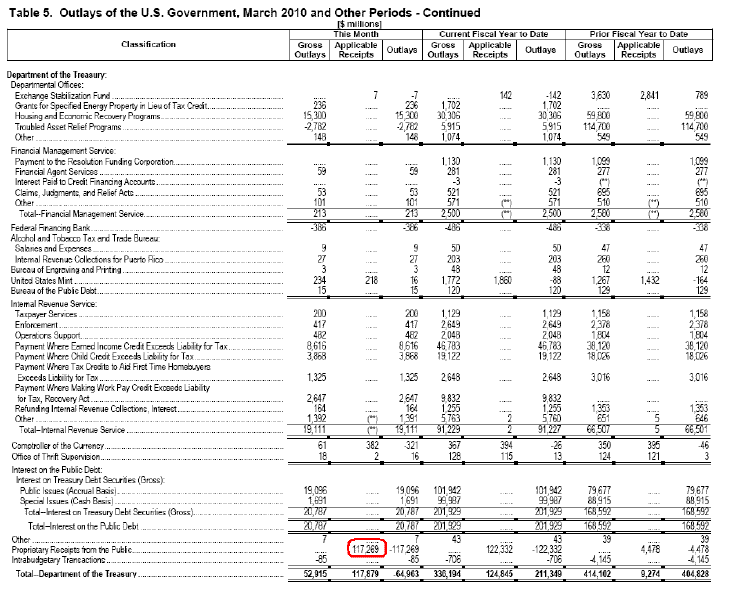
CLICK TO ENLARGE
My investigations suggest that it is likely
suspiciously engineered TARP (Troubled Asset Relief
Program) money being returned to the US Treasury, along with a slowdown in
TARP issuance versus budget. Assuming this is the case, and not simply an
aircraft carrier or two we have sold and are now leasing back, like
California is doing with all state owned buildings, we still have a major
problem. What happens next month? The TARP fund returns will stop or we
will run out of aircraft carriers. Is unemployment going to surge or
are corporate tax receipts going to expand by over $117B next month?
Timothy Geithner and the US Treasury somehow dodged the bullet because
of ‘other’ this month. How does it look for next month for cash
management? Let’s consider tax receipts to see if there is a possible
‘rabbit in the hat’ there.
TAX RECEIPTS
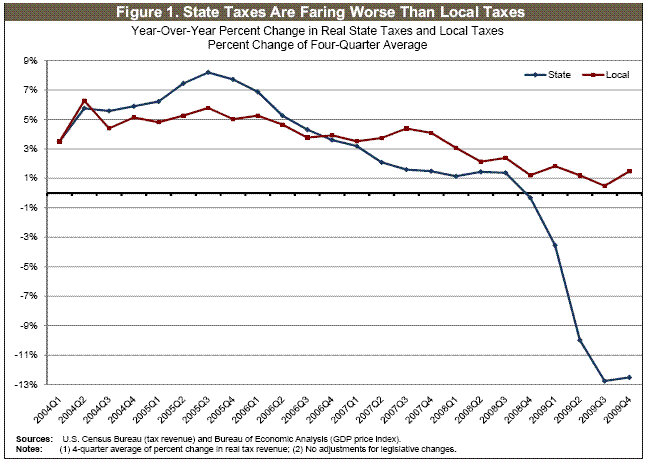
You personally met your April 15th tax filing deadline and you
likely took some consolation in your tax frustrations by knowing you
weren’t alone. The quiet truth is you are becoming more alone each year if
you haven’t understood the new realities of the US Tax game. 47% of
Americans (3) and two-thirds of US corporations (4) will pay no taxes in
2010. Where do you fit? These are pretty startling revelations to most
of us and don’t bode well to fixing the monthly Treasury cash requirements
quickly, especially with unemployment still stubbornly elevated.
PERSONAL INCOME TAX
The Associated Press reported on April 7th, 2010.
 About
47 percent will pay no federal income taxes at all for 2009.
Either their incomes were too low, or they qualified for enough credits,
deductions and exemptions to eliminate their liability. That's according
to projections by the Tax Policy Center, a Washington research
organization.
About
47 percent will pay no federal income taxes at all for 2009.
Either their incomes were too low, or they qualified for enough credits,
deductions and exemptions to eliminate their liability. That's according
to projections by the Tax Policy Center, a Washington research
organization.
In recent years, credits for low- and middle-income families have grown
so much that a family of four making as much as $50,000 will owe no
federal income tax for 2009, as long as there are two children younger
than 17, according to a separate analysis by the consulting firm
Deloitte Tax.
Tax cuts enacted in the past decade have been generous to wealthy
taxpayers, too, making them a target for President Barack Obama and
Democrats in Congress. Less noticed were tax cuts for low- and
middle-income families, which were expanded when Obama signed the
massive economic recovery package last year.
The result is a tax system that exempts almost half the country from
paying for programs that benefit everyone,
including national defense, public safety, infrastructure and education.
It is a system in which the top 10 percent of earners — households
making an average of $366,400 in 2006 — paid about 73 percent of the
income taxes collected by the federal government.
EXAMPLE
The family was entitled to a standard deduction of $11,400 and four
personal exemptions of $3,650 apiece, leaving a taxable income of
$24,000. The federal income tax on $24,000 is $2,769. With two children
younger than 17, the family qualified for two $1,000 child tax credits.
Its Making Work Pay credit was $800 because the parents were married
filing jointly. The $2,800 in credits exceeds the $2,769 in taxes, so
the family makes a $31 profit from the federal income tax. That ought to
take the sting out of April 15.
With the government presently talking about once again extending
unemployment benefits, it appears we have more downside than upside on the
income tax revenue receipt line item going forward.
CORPORATE TAX
The Center for American Progress reported in 2004, while fighting President
George W Bush’s further cuts in corporate taxation:
The news that more than 60 percent of U.S. corporations failed to pay
any federal taxes from 1996 through 2000 when corporate profits were
soaring and that corporate tax receipts had fallen to just 7.4 percent
of overall federal tax revenue in 2003 – the lowest since 1983 and the
second-lowest rate since 1934 – is an outrage. But it should come as no
surprise to anyone who has been paying attention to national tax policy
over the past few years. The General Accounting Office (GAO) report also
found that an astonishing 94 percent of corporations reported tax
liability of less than 5 percent of their total income during the same
time period.
The last Special General Accounting Office (GAO) study concerning
corporate taxation was in 2004 and it showed:
The corporate income tax rate is ostensibly 35 percent, but companies
are able to reduce their effective burden by claiming various deductions
and credits. US companies paid an average of $11.88 (1.19 percent) in
corporate taxes for every $1,000 in gross receipts, the study said.
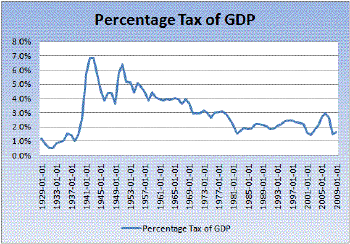 Foreign-owned
companies fared better in some respects than their US-based competitors.
The report found that 71 percent of foreign-controlled corporations
paid no taxes on their US income, while 89 percent had liabilities of
less than 5 percent of their income.
Foreign-owned
companies fared better in some respects than their US-based competitors.
The report found that 71 percent of foreign-controlled corporations
paid no taxes on their US income, while 89 percent had liabilities of
less than 5 percent of their income.
The GAO didn't attempt to determine why so many companies were able to
avoid paying taxes. It said possible explanations included legitimate
deductions for current-year operating losses, losses carried forward
from previous years, and sufficient credits to offset any tax
liabilities. In addition, it said improper pricing of transactions
between US and foreign operations could contribute to tax avoidance.
The percentage of federal tax collections paid by corporations has
tumbled from a high of 39.8 percent in 1943 to a low of 7.4 percent last
year. It ranged from 10 percent to 11 percent in 1996-2000, the period
studied by the GAO.
Boston Globe
04-11-04
In 2005 the GAO issued another report. The Washington Post’s analysis in
Many Firms didn’t pay Taxes highlighted:
About two-thirds of corporations operating in the United States did not
pay taxes annually from 1998 to 2005. In 2005, after collectively making
$2.5 trillion in sales, corporations gave a variety of reasons on their
tax returns to account for the absence of taxable revenue. The most
frequently listed included the cost of producing their goods, salary
expenses and interest payments on their debt, the report said. The GAO
did not analyze whether the firms had profits that should have been
taxed.
Sen. Byron L. Dorgan (D-N.D.) called the findings "a shocking indictment
of the current tax system."
"It's
shameful that so many corporations make big profits and pay nothing to
support our country," he said. "The tax system that allows this
wholesale tax avoidance is an embarrassment and unfair to hardworking
Americans
who pay their fair share of taxes. We need to plug these tax loopholes
and put these corporations back on the tax rolls."
Eric Toder, a senior fellow at the Urban Institute, said the vast
majority of corporations are small businesses and start-ups that have
adopted a corporate structure that allows them to lower their tax bills.
"I'm not trying to imply that there aren't tax-compliance issues among
small corporations," he said. "But when you are talking about businesses
that size, I would suspect the norm would be to not pay taxes, and
there's nothing nefarious about that." Toder had not yet seen the GAO
study.
A greater proportion of large corporations pay taxes, according to the
GAO. In 2005, about 28 percent of large corporations paid no taxes. Of
the 1.3 million corporations included in the study, 998 were categorized
as "large."
Dorgan and Sen. Carl M. Levin (D-Mich.) requested the report out of
concern that some corporations were using "transfer pricing" to
reduce their tax bills. The practice allows multi-national companies to
transfer goods and assets between internal divisions so they can record
income in a jurisdiction with low tax rates.
The GAO said data on transfer pricing were scarce. Instead, it compared
the percentages of foreign- and U.S.-controlled corporations that are
paying taxes.
In general, the GAO found that slightly more foreign firms paid no
taxes. From 1998 to 2005, 68 percent of foreign-controlled
corporations sent nothing to the Internal Revenue Service, compared with
66 percent of U.S. companies. The report noted in an opening paragraph,
however, that the GAO did not study whether the foreign companies were
using transfer pricing.
Still, Levin said: "This report makes clear that too many corporations
are using tax trickery to send their profits overseas and avoid paying
their fair share in the United States."
It has only become worse, with President George W Bush tax cuts and corporate friendly
tax policy. President Barack Obama has been preoccupied with spending to
consider revenue receipts as a priority.
Additionally, offshore tax accounting is completely un-policed
and highly secretive with approximately 30 countries serving as tax havens to help corporations avoid taxes. The addition of
$605T derivatives market now makes it almost impossible to police global
corporations from tax avoidance.
Below is the current Federal Reserve’s Tax Receipts on Corporate Income
where I have added the budget expectation for 2010 of $156.7B. As you have
already seen, we are presently falling behind last year's rate of tax
receipts.
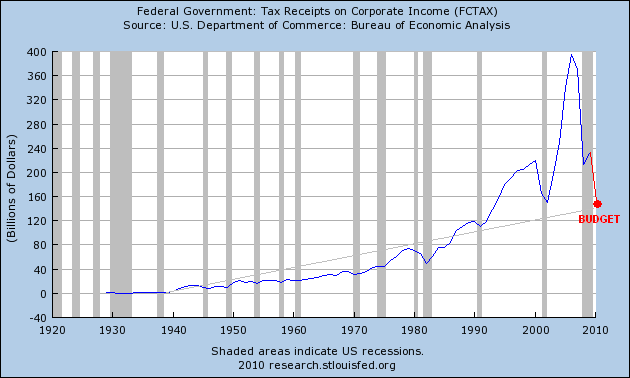
When we
compare corporate tax receipts to Nominal GDP we see huge disparities that
are now built into the US Corporate Taxation policy. When GDP was growing,
US Taxation was not. The effective rates after loopholes and
offshore accounting created the following results.
A HORRIFIC CHART

Corporate and Personal taxes are not going to materially fix the US Cash Crunch
short term.
This alarming chart suggests one or more of three possibilities:
1- There is no relationship between corporate taxes and GDP.
2- Corporate pretax profits have seen near exponential growth over the
last 30 years without being reflected in US taxes receipts.
3- Pretax corporate profits have become more and more an offshore
phenomone.
In an analysis of taxes paid by 275 of the largest U.S. corporations,
the liberal watchdog group Citizens for Tax Justice found that effective
corporate tax rates have fallen by 20 percent since 2001, even as pretax
profits jumped 26 percent. Between 2001 and 2003, the 275 companies paid
taxes totaling 18.4 percent on their total profits, about half the 35
percent corporate income tax rate. Of the 275, 82 either paid no
taxes or received large refunds in at least one of the past three years.
The
Washington Post
12-26-04
Investors are operating under the notion that an improvement in the
economy and employment will alleviate the pressures on the Treasury
Auction. This notion I believe is misplaced. Though I am skeptical about
significant improvements in either the economy or employment, this view is
mute in comparison to what will actually be required to make a material
difference to tax receipts. The problems described above are intractable
without major congressional policy initiatives. Congress is presently
doing nothing to address them. In fact they are headed in absolutely the
opposite direction.
So the question is even more difficult to answer. Where will tax receipts
come from to keep the US Treasury from being forced to place accelerating
supply on the monthly Treasury Auction?
DEBT ISSUANCE
I know
many of you are saying we will just be forced to place more supply
on the Treasury Auction and accept higher rates. As I mentioned earlier,
the US
has
already moved down the duration curve steadily over the last
few years to make increasing debt levels less onerous. It obviously comes
with huge risk, considering interest rates are at all time historic lows.
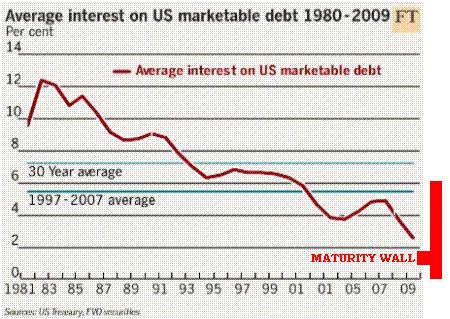
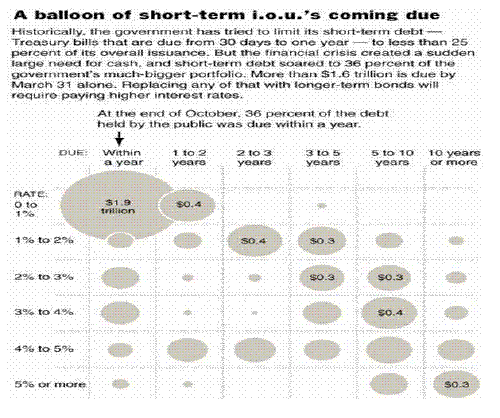
If we were forced to refinance the national debt at 5.5% versus the
average maturity of just over 2% shown above, we would have a serious
problem. We need to place corporate tax receipts versus interest payment
rate charges in perspective.
|
$14T National Debt at 5.5% |
$770B |
|
$14 T National Debt @ a 3% difference |
$420B |
|
Total US Corporate Income Tax Budget for 2010 |
$157B |
This is too
far out to be critical to our monthly cash management concerns, but is
still a major strategic consideration affecting short term US Treasury
Auction options. Closer in however, the US Treasury is obviously caught in
a vise about not pushing rates up any faster than absolutely necessary for
concern that in the not too distant future the very existence of the US
and its ability to service its debt may be at stake.
CONCLUSION
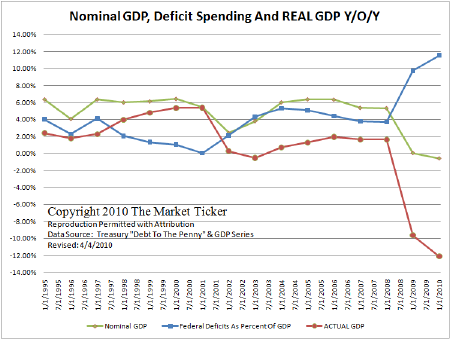
The US cash
management challenge is significant. Taking out this month’s ‘plug’
number, any surprises or further delays in economic rebound will
likely trigger serious market reactions.
“This story is not going
to stop at the end of the year.
There is inertia in the
deterioration of credit metrics.”
Moody’s Investor Services
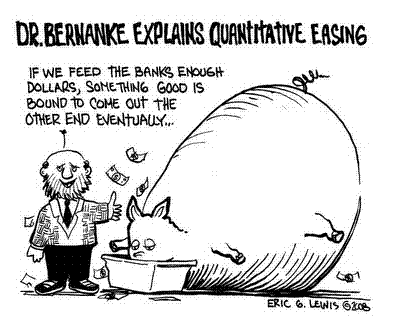
Sign Up for the next release in the
Extend & Pretend series:
Commentary
SOURCES:
(1) 04-14-10
March
2010t Issue: Monthly Treasury Statement: Publications & Guidance:
Financial Management Service
(2) 04-13-10
The
incredible shrinking deficit
Salon.com
(3) 04-07-10
Nearly half of US households escape fed income tax
AP
(4) 04-11-04
Most
US firms paid no income taxes in '90s
Boston Globe
(5) 12-26-04
Corporate Taxes: Going, Going
The Washington Post
The last Extend & Pretend article:
EXTEND & PRETEND - Gaming the US Tax Payer
Gordon T Long
Tipping Points
Mr. Long is a former senior group executive with IBM & Motorola, a
principle in a high tech public start-up and founder of a private venture
capital fund. He is presently involved in private equity placements
internationally along with proprietary trading involving the development &
application of Chaos Theory and Mandelbrot Generator algorithms.
Gordon T Long is not a registered advisor and does not give investment
advice. His comments are an expression of opinion only and should not be
construed in any manner whatsoever as recommendations to buy or sell a
stock, option, future, bond, commodity or any other financial instrument
at any time. While he believes his statements to be true, they always
depend on the reliability of his own credible sources. Of course, he
recommends that you consult with a qualified investment advisor, one
licensed by appropriate regulatory agencies in your legal jurisdiction,
before making any investment decisions, and barring that, you are
encouraged to confirm the facts on your own before making important
investment commitments.
© Copyright 2010 Gordon T Long. The information herein was obtained from
sources which Mr. Long believes reliable, but he does not guarantee its
accuracy. None of the information, advertisements, website links, or any
opinions expressed constitutes a solicitation of the purchase or sale of
any securities or commodities. Please note that Mr. Long may already have
invested or may from time to time invest in securities that are
recommended or otherwise covered on this website. Mr. Long does not intend
to disclose the extent of any current holdings or future transactions with
respect to any particular security. You should consider this possibility
before investing in any security based upon statements and information
contained in any report, post, comment or recommendation you receive from
him.





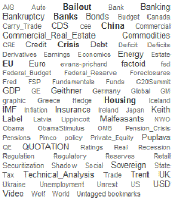




 The
US Government is caught in a cash vise and is being squeezed between
too slow a rebound in tax revenues and the limitations on how quickly it
can realistically take its funding requirements to the US Treasury
auction. The US Treasury was saved in March by what the government reports
as “proprietary receipts”. Those receipts require an explanation that is
not well publicized since it begs the question of what happens next month
without the $117 BILLION journal entry.
The
US Government is caught in a cash vise and is being squeezed between
too slow a rebound in tax revenues and the limitations on how quickly it
can realistically take its funding requirements to the US Treasury
auction. The US Treasury was saved in March by what the government reports
as “proprietary receipts”. Those receipts require an explanation that is
not well publicized since it begs the question of what happens next month
without the $117 BILLION journal entry.
 About
47 percent will pay no federal income taxes at all for 2009.
Either their incomes were too low, or they qualified for enough credits,
deductions and exemptions to eliminate their liability. That's according
to projections by the Tax Policy Center, a Washington research
organization.
About
47 percent will pay no federal income taxes at all for 2009.
Either their incomes were too low, or they qualified for enough credits,
deductions and exemptions to eliminate their liability. That's according
to projections by the Tax Policy Center, a Washington research
organization.
